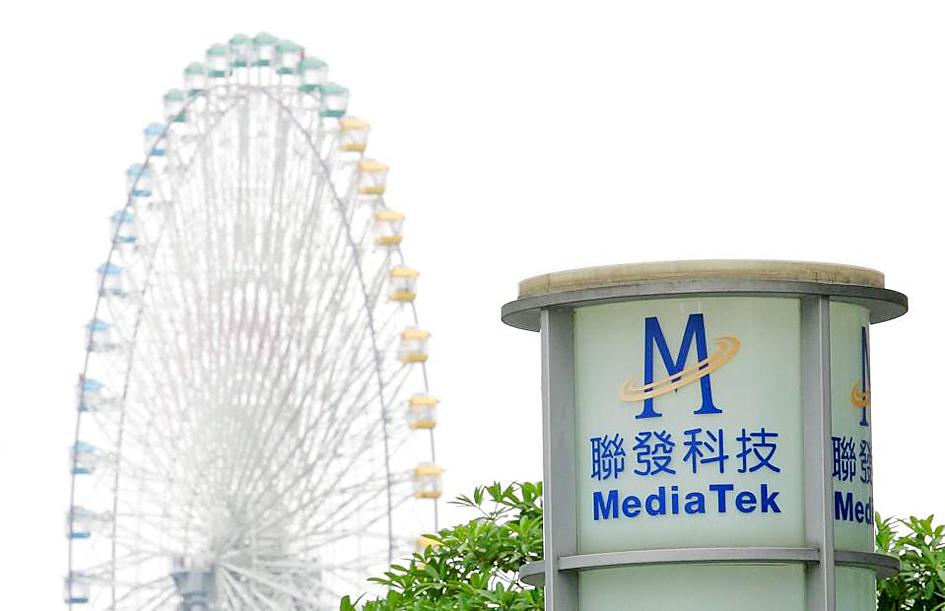Mobile phone chip designer MediaTek Inc (聯發科) posted an average of NT$5.15 million (US$173,249) in annual compensation for non-managerial employees last year, marking the highest among all firms listed on the Taiwan Stock Exchange (TWSE), exchange data showed.
That is a 66 percent increase from the company’s average compensation of NT$3.08 million in 2020, as its earnings per share (EPS) expanded from NT$26.01 in 2020 to NT$70.56 last year.
That is also three times higher than the average compensation of NT$1.7 million in the nation’s semiconductor industry, the data showed.

Photo: Bloomberg
The increases helped MediaTek advance its ranking from third in 2020, replacing Foxconn Technology Co (鴻準精密), a subsidiary of Hon Hai Precision Industry Co (鴻海精密). Foxconn Technology’s ranking dropped to fifth place last year from first with average compensation of NT$4.1 million, the data showed.
MediaTek’s annual compensation also marked an overall all-time high since TWSE companies began disclosing non-managerial salaries in 2018, the data showed.
Seven of the top 10 highest-paying firms are semiconductor companies, compared with six in 2019 and 2020, with vehicle manufacturer Hotai Motor Co (和泰汽車) and some construction companies leaving the list, the data showed.
Taiwan Semiconductor Manufacturing Co (TSMC, 台積電), the world’s largest contract chipmaker, ranked 16th, with average annual compensation of NT$2.42 million last year, partially because of its large employee base of 53,212. Except TSMC, all semiconductor firms in Taiwan have fewer than 10,000 employees, the data showed.
Evergreen Marine Corp (長榮海運) ranked seventh with average annual compensation of NT$3.61 million, and Yang Ming Marine Transport Corp (陽明海運) ranked ninth with compensation averaging NT$2.75 million, the first time shipping companies have been in the top 10 since 2018, the data showed.
Shipping companies last year offered employees greater year-end bonuses given their greater EPS, boosting compensation that includes recurring wages, overtime pay and bonuses, the data showed.
Average compensation for non-managerial employees in the shipping industry grew 21 percent to NT$1.32 million from NT$1.09 million a year earlier, given rises in freight rates, the data showed.
Among all industries, the semiconductor trade posted the greatest average compensation for non-managerial employees at NT$1.7 million, followed by the steel industry at NT$1.48 million, the plastic industry at NT$1.34 million, the financial and insurance industry with NT$1.33 million, and the computer industry with NT$1.32 million, the data showed.

In Italy’s storied gold-making hubs, jewelers are reworking their designs to trim gold content as they race to blunt the effect of record prices and appeal to shoppers watching their budgets. Gold prices hit a record high on Thursday, surging near US$5,600 an ounce, more than double a year ago as geopolitical concerns and jitters over trade pushed investors toward the safe-haven asset. The rally is putting undue pressure on small artisans as they face mounting demands from customers, including international brands, to produce cheaper items, from signature pieces to wedding rings, according to interviews with four independent jewelers in Italy’s main

Japanese Prime Minister Sanae Takaichi has talked up the benefits of a weaker yen in a campaign speech, adopting a tone at odds with her finance ministry, which has refused to rule out any options to counter excessive foreign exchange volatility. Takaichi later softened her stance, saying she did not have a preference for the yen’s direction. “People say the weak yen is bad right now, but for export industries, it’s a major opportunity,” Takaichi said on Saturday at a rally for Liberal Democratic Party candidate Daishiro Yamagiwa in Kanagawa Prefecture ahead of a snap election on Sunday. “Whether it’s selling food or

CONCERNS: Tech companies investing in AI businesses that purchase their products have raised questions among investors that they are artificially propping up demand Nvidia Corp chief executive officer Jensen Huang (黃仁勳) on Saturday said that the company would be participating in OpenAI’s latest funding round, describing it as potentially “the largest investment we’ve ever made.” “We will invest a great deal of money,” Huang told reporters while visiting Taipei. “I believe in OpenAI. The work that they do is incredible. They’re one of the most consequential companies of our time.” Huang did not say exactly how much Nvidia might contribute, but described the investment as “huge.” “Let Sam announce how much he’s going to raise — it’s for him to decide,” Huang said, referring to OpenAI

The global server market is expected to grow 12.8 percent annually this year, with artificial intelligence (AI) servers projected to account for 16.5 percent, driven by continued investment in AI infrastructure by major cloud service providers (CSPs), market researcher TrendForce Corp (集邦科技) said yesterday. Global AI server shipments this year are expected to increase 28 percent year-on-year to more than 2.7 million units, driven by sustained demand from CSPs and government sovereign cloud projects, TrendForce analyst Frank Kung (龔明德) told the Taipei Times. Demand for GPU-based AI servers, including Nvidia Corp’s GB and Vera Rubin rack systems, is expected to remain high,